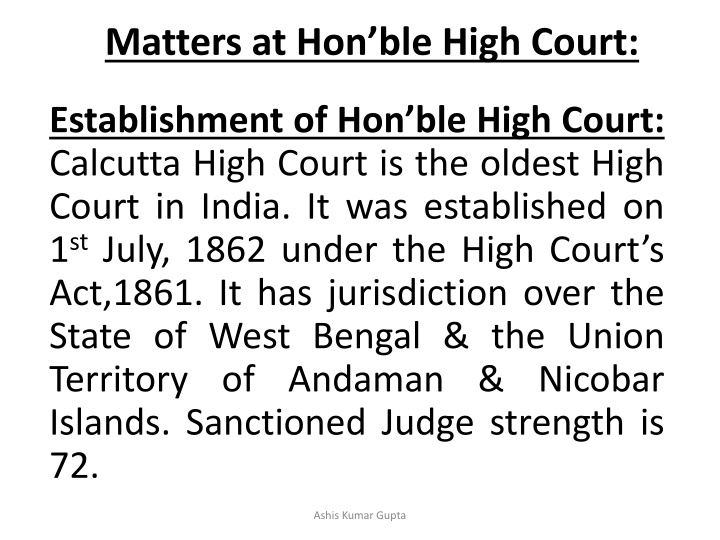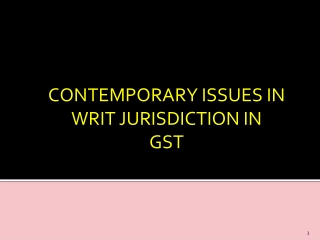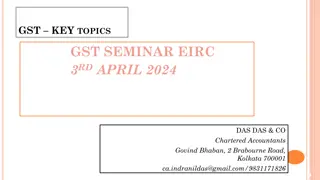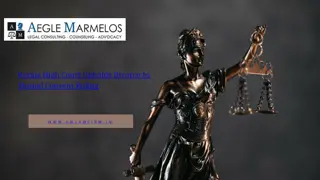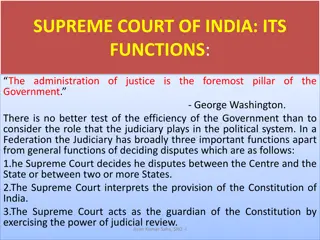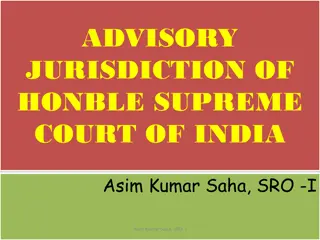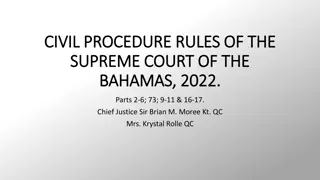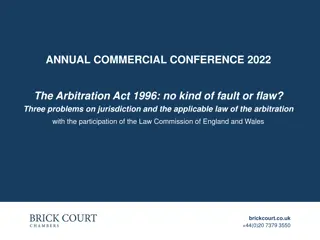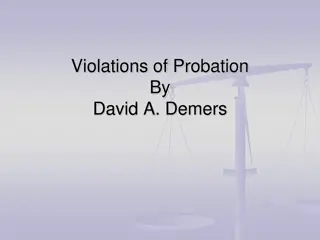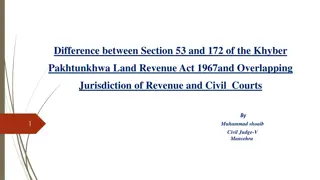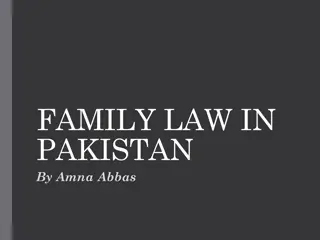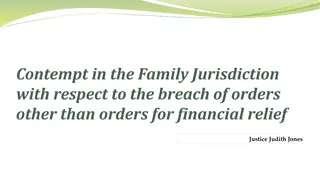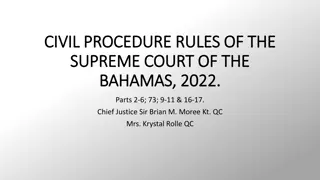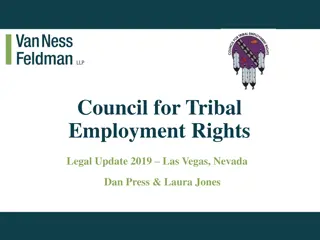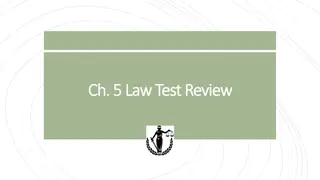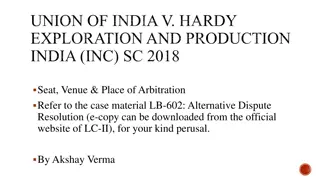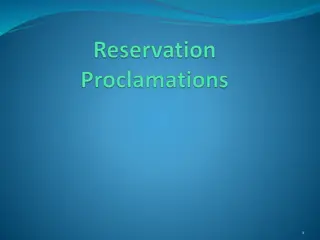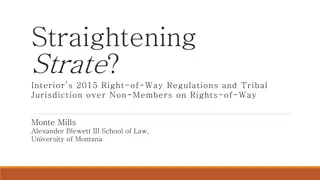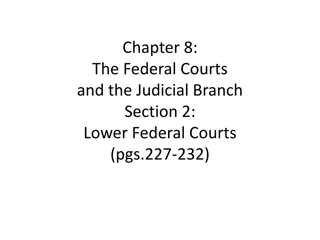Overview of Calcutta High Court's Jurisdiction
Established in 1862, Calcutta High Court is the oldest high court in India with jurisdiction over West Bengal and the Andaman & Nicobar Islands. It has 72 sanctioned judges. The court's jurisdiction includes civil, criminal, admiralty, and matrimonial matters. It exercises original and appellate jurisdiction, with specific criteria for invoking civil jurisdiction in Calcutta. Extraordinary civil jurisdiction allows the High Court to take up cases pending in lower courts. Criminal jurisdiction is also outlined.
Download Presentation

Please find below an Image/Link to download the presentation.
The content on the website is provided AS IS for your information and personal use only. It may not be sold, licensed, or shared on other websites without obtaining consent from the author.If you encounter any issues during the download, it is possible that the publisher has removed the file from their server.
You are allowed to download the files provided on this website for personal or commercial use, subject to the condition that they are used lawfully. All files are the property of their respective owners.
The content on the website is provided AS IS for your information and personal use only. It may not be sold, licensed, or shared on other websites without obtaining consent from the author.
E N D
Presentation Transcript
Matters at Honble High Court: Establishment of Hon ble High Court: Calcutta High Court is the oldest High Court in India. It was established on 1stJuly, 1862 under the High Court s Act,1861. It has jurisdiction over the State of West Bengal & the Union Territory of Andaman & Nicobar Islands. Sanctioned Judge strength is 72. Ashis Kumar Gupta
Jurisdiction of the High Courts: The jurisdiction of each high court depends on the letters Patent issued by her Majesty. She could give them power to exercise all civil, criminal, intestate, testamentary, admiralty and matrimonial jurisdiction. She could also confer on them original and appellate jurisdiction and all such powers and authority with respect to the administration of justice in the presidency, as she thought fit. Thus High Courts were given the following original and appellate jurisdiction. Ashis Kumar Gupta
1. Original jurisdiction: The court had original jurisdiction in the following matters: (a) Civil Jurisdiction and (b) Criminal Jurisdiction (a) Civil Jurisdiction: The Original Civil Jurisdiction of the court was of two types:- Ashis Kumar Gupta
Ordinary Ordinary Civil Jurisdiction extended to the town of Calcutta and such local limit as from time to time could be prescribed by law of a competent legislature in British India. All suits of the value of Rs. 100 or more and which were not cognizable by the small court at cognizable under High Courts. Civil Jurisdiction: The Calcutta were Ashis Kumar Gupta
Further, the ordinary civil jurisdiction could be invoked only if: The movable property was situated within the town of Calcutta; The cause of action wholly or partly arose in Calcutta; The defendant was carrying on business or working for gain in Calcutta. Ashis Kumar Gupta
Extra Ordinary Civil Jurisdiction: Extra Ordinary Civil Jurisdiction provides that the High Court could call a case pending in any lower court subject to its superintendence and could decide that case itself. This jurisdiction could be exercised in a case where the parties agreed to such exercise or the High Court thought it proper to impart justice. Ashis Kumar Gupta
Criminal Jurisdiction: It is of two types also:- Ordinary Original Criminal Jurisdiction: In exercise of its Ordinary Original Criminal Jurisdiction the High Court was empowered to try all persons brought before it in due course of law. This jurisdiction was made available over the native criminals and crimes committed with the local limits of the presidency towns and beyond this limit over the Britishers and Europeans as the Supreme Court used to enjoy the jurisdiction over them before the establishment of the High Court. Ashis Kumar Gupta
ii. Extra Ordinary Original Criminal Jurisdiction: The High Courts were to have extra Ordinary Jurisdiction which was not enjoyed by the High Court. Under this jurisdiction the High Court hear any criminal case against any person within the cognizance of any court which was superintendence of the High Court. If such case was referred to the high court by the advocate general or by any magistrate or any other officer specially empowered for that purpose. Original Criminal subject to the Ashis Kumar Gupta
Revenue Jurisdiction: The High Court was given jurisdiction to here revenue cases also which were precluded from the jurisdiction of the Supreme Court by the Act of Settlement, 1781. Admiralty Jurisdiction: admiralty and jurisdiction was also given to the high court. Ashis Kumar Gupta The vice-admiralty
Testamentary and miscellaneous jurisdiction: The High Courts were given similar testamentary, intestate and probate jurisdiction as was enjoyed by the Supreme Court. It also worked as the court of words for the administration of the estate and persons (lunatics, idiots and minors). Ashis Kumar Gupta
Appellate jurisdiction of the High Court was of two types:- (a) Civil Jurisdiction: The High Court could hear appeals in all cases authorised by any law or regulation. (b) Criminal Jurisdiction: The High Court had criminal jurisdiction in all cases decided by the subordinate courts to it. It could also entertain revisions against the decision of the lower court and reference from them. Ashis Kumar Gupta Jurisdiction: The appellate
At the Honble High Court writ Petitions may be filed before the Appellate Side or Original Side depending on whether the Address of the Petitioners/defendants fall within the Appellate Jurisdiction or Original Jurisdiction of Calcutta high Court respectively or whether extra- ordinary original jurisdiction is being invoked. Ashis Kumar Gupta
Some relevant terms relating to Rules of Original Side/Appellate Side: i)Application (Original Side): Shall have the same meaning as Petition and would mean the main application or petition to initiate any proceeding in the original jurisdiction of High Court. Ashis Kumar Gupta
Application(Appellate Side):Means the main Application to initiate proceeding for Civil Order or Criminal Misc.Cases or Civil or Criminal Revisional Jurisdiction of the High Court and would include contempt applications. ii) Memo Of Appeal :Means Memo of Appeal either for Civil or Constitutional Writ Jurisdiction of the Original Side or A memo of appeal for Civil, Criminal or Mandamus Appeal Ashis Kumar Gupta
iii)Petition-Means the main petition to initiate or invoke Jurisdiction of the High Court as well as Contempt Proceedings and is defined in Appellate side Rules. iv)Interlocutory Application-Applies Appellate/Original Side Rules and means any application other than as mentioned above/before. v)Plaint-Includes any pleading initiating a proceeding under the provisions of law as in force and as applies to Original Side Rules. the Constitutional to Ashis Kumar Gupta
Absolute Necessary Articles of Constitution of India relating to powers of Hon ble High Court: Article 226 : Vide this Article, High Court has the power to issue to any person/ authority/ direction, order, enforcement of rights conferred in Part III(Fundamental Rights) of the Constitution of India or for any other purpose. Government, writs for Ashis Kumar Gupta
Types of Writs: i)Habeas Corpus: The writ is issued to produce a person detained,either in prison or in private custody, before the Court and release him if the detention is illegal i)Mandamus: Command from High Court to Lower Courts, Tribunal, Public Authority to perform statutory duty. who has been Ashis Kumar Gupta
ii) Certiorari: The Writ is issued quashing the order passed by inferior Court, Tribunal, Quasi-Judicial Authority iv)Prohibition: Issued inferior Court/Quasi-Judicial Authority from continuing the proceeding of a particular case where it has no jurisdiction. v)Quo Warranto:The writ is issued to restrain a person from holding public office to which he is not entitled. Ashis Kumar Gupta prohibiting any
Article 227: Confers the power of Superintendence over all Courts by the High Court; it can be invoked to correct errors of jurisdiction but not to upset findings of the fact. Under this Article the High Court may call for returns from lower Courts. High Court may make and issue Rules and prescribe forms regarding the practice and proceedings of lower Courts. Ashis Kumar Gupta
However, the Article does not confer the power of superintendence over constituted under law relating to Armed Forces. The primary concern of the of the State Respondent/Petitioners in respect of dealing with Original/Appellate Side issues is in the procedure of engagement of State Advocate. In case of petition filed before the Original engagement of State Advocate is dealt with by the office of Ld. AOR, W.B while for petitions filed before the Appellate Side, the engagement of State Advocate is dealt with by the office of Ld. Legal Remembrancer, W.B. Ashis Kumar Gupta any Court/Tribunal Jurisdiction, the
Of the various types of cases, the most frequent types that are needed to be dealt with are: W.P(Writ Petition): These may be filed before the Ld. Single Bench in respect of matters relating to MM(D&R) Act and/or in respect of other Act(s) also if the Petitioners seek relief in the form of issuance of Writs (Certiorari, Prohibition, Mandamus ,etc.)Ashis Kumar Gupta
WPLRT: These are Writ Petitions filed before the Hon ble Division Bench of High Court by the Petitioners who are aggrieved with the judgment of LRTT as passed in OA/TA, etc.; there is no time limit for filing these Writs. Ashis Kumar Gupta
COLRT: The supervisory jurisdiction conferred on the High Courts under Article 227 of the Constitution is limited to seeing that an inferior Court or Tribunal functions within the limits of its authority, and not to correct an error apparent on the face of the record, or anything that is much less than an error of law. Ashis Kumar Gupta
These are Writ Petitions filed before the Hon ble Division Bench of High Court under Article 227 of the Constitution by the Petitioners who are aggrieved with the judgment of the Hon ble WBLRTT passed in OA/TA, etc. as while passing the judgment the Hon ble Tribunal has surpassed its jurisdiction; there is no time limit for filing these Writs. Ashis Kumar Gupta
However, the power of supervisory jurisdiction does not vest the High Court with any unlimited prerogative to correct all species of hardship or wrong decisions made within the limits of the jurisdiction of the Court or Tribunal and therefore, it must be restricted to grave derelictions of duty and flagrant abuse of fundamental principle of law or justice. Ashis Kumar Gupta
WPST: These are Writ Petitions filed before the Hon ble Division Bench of High Court by the Petitioners who are aggrieved with the judgment of WBAT as passed in OA, MA, etc.; here also there is no time limit. SA: Second Appeal; these arise out of judgment of Ld. Addl. District Judge in Title Appeals. Ashis Kumar Gupta
CAN: These are normally Civil Applications filed in connection with any already filed W.P/ FMAT, etc CPAN- (i) Contempt Application (Appellate Side) (ii) CC-Contempt of Court Cases (Original side) Ashis Kumar Gupta
RVW-Review Petitions, these are filed seeking review/recalling of any order as passed by Hon ble High Court. CRR- Criminal Revision CR- Civil Revision WP.CRC-Civil Rule (Contempt) CRAN-Criminal Application Ashis Kumar Gupta
APO-Appeal from Order (Original side) CP-Company Petition (Original Side) CA- (Company Applications (Original Side) CO-Civil Misc.Case (Civil Order) (Appellate Side) (Special mentionable- CO.LRT) Ashis Kumar Gupta
FMAT: Admission of Civil Appeal from Order MAT: Tender of Mandamus Appeal Ashis Kumar Gupta
As per WBLR Manual91, the Law-Cell of DLLRO is a body constituted and such law-cell is entrusted with duties of engagement of State Advocate, filing of appeals, etc; but ROs at Block as also BLLROs are required to maintain close liaison with the district law-cell who in turn need to keep close liaison with the law-cell at Directorate. Ashis Kumar Gupta
Introduction to some terms as are acquainted with functioning at Law-Cell: Brief-history: Since meeting the Ld. State Advocate appearing for State Respondents in a particular case, we need to prepare a brief history of the matter as represented Application/ Petition. via Ashis Kumar Gupta
Statement Of facts: Based on the depiction of events as enumerated para-wise in Application/ Memo of Appeal, etc, we need to prepare and present to the Ld. State Advocate a statement of facts para-wise itself based on office records and provisions of law. the Petition/ Ashis Kumar Gupta
List of Dates: An attempt to chronologically set out the various events as are incidental to the filing of the Petition and its adjudication. Ashis Kumar Gupta
Grounds of Appeal: If we are aggrieved with the order of a particular Court and are considering preferring appeal at higher forum, we need to prepare grounds of appeal based on law points as are apparently overlooked/ misinterpreted by the trial Court. Ashis Kumar Gupta
Affidavit-in-Opposition: If directed by Hon ble High Court, we may need to file an affidavit opposing the contentions of the Petition and based on such Written Affidavit affirmed Commissioner of Oaths at High Court as also based on oral pleadings by the Ld.Advocate appearing, Hon ble High Court moves to dispose the Petition,etc. before the Ashis Kumar Gupta
Affidavit-in-Reply: If we are the Petitioner, then Hon ble Court may permit Opposition to be filed by the Respondents and we may get the chance to file Reply to such Opposition. Ashis Kumar Gupta
Special Caution is needed while filing these Affidavits for the disposal of the Case depends on facts and statements as in Affidavit and High Court being a Court of Records vide Art.215 of Constitution of proceedings are enrolled for perpetual memory and testimony. India its acts/ Ashis Kumar Gupta
Contempt of Court Contempt of court is behavior that oppose s or defies the authority, justice and dignity of the court. Contempt charges may be brought against parties to proceedings; lawyers or other court officers or personnel; jurors; witnesses; or people who insert themselves in a case, such as protesters outside a courtroom. Ashis Kumar Gupta
Courts have great leeway in making c ontempt charges, and thus confusion sometimes exists about the distinctions between types of contempt. Generally, however, contempt proceedings are categorized as civil or criminal, and di rect or indirect. Acquaintance with the Contempt of Courts Act, 1971 is required. Ashis Kumar Gupta
Business of Court Of all the Courts as function at High Court some are Single Bench being managed by a single Hon ble Justice but there are also comprising of at least 2 judges. The daily as well as monthly schedule of the Courts at High Court are published in the form of Daily List/ Monthly List. Division Benches Ashis Kumar Gupta
In respect of all various types of appeals that are filed at various levels, officers should keep themselves acquainted with the provision of Sec.5 of Limitation Act,1963 and/or Sec.10 of WBLRTT Act,1997, etc., because the period(s) of limitation in respect of filing of various appeals/review, etc. are detailed in such sections. We may need to contest the prayers for condonation of delay to appeal, if appeal is preferred by individual petitioner or may also need to describe the reasons for delay, if delay is caused in preferring appeal on our part. Ashis Kumar Gupta
Besides, all these issues at various Courts, there may be occasions to go to Hon ble Supreme Court also in connection with Appeals as arise from the order(s) of Division Bench of Hon ble High Court procurement of Certified Copy of the order is a primary duty. and then Ashis Kumar Gupta
For Obtaining Certified Copy of Judgments Pronounced By The Hon ble High Court Application is to be made to the Ld. Legal Remembrancer, Government of West Bengal, 2 & 3 Kiran Shankar Roy Road, 5th Floor, Kolkata- 700001. Ashis Kumar Gupta
To mention- (i) Case Number (ii) Cause Title (iii) Bench (iv)Order date A copy of the application may be forwarded to the Directorate. Ashis Kumar Gupta
Thank You Ashis Kumar Gupta
